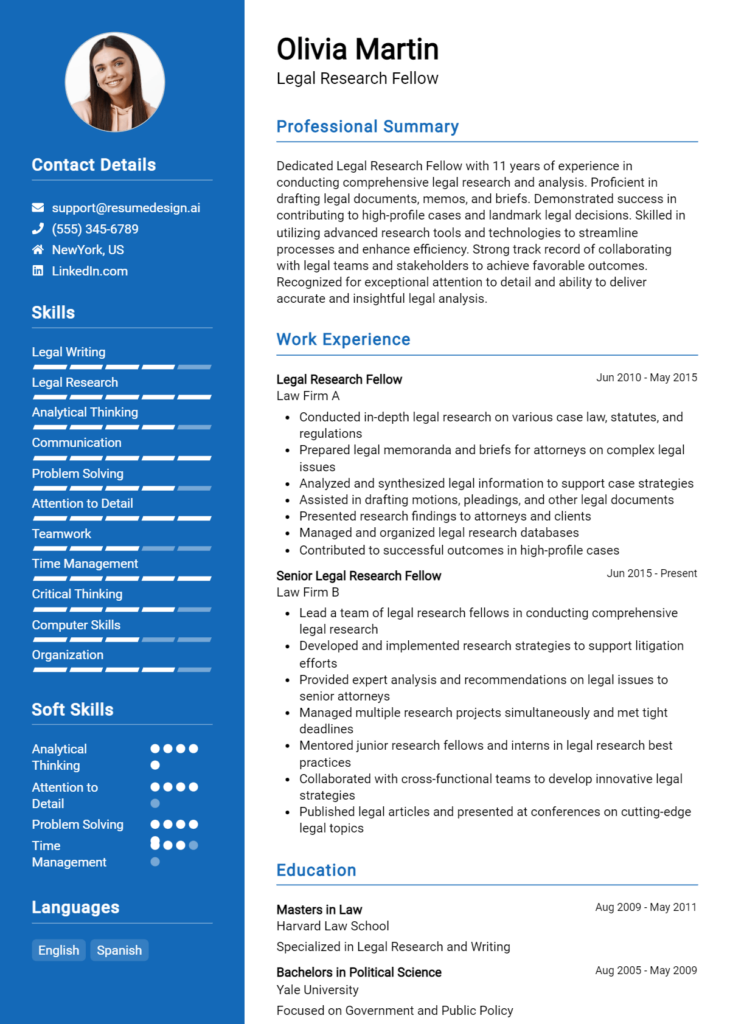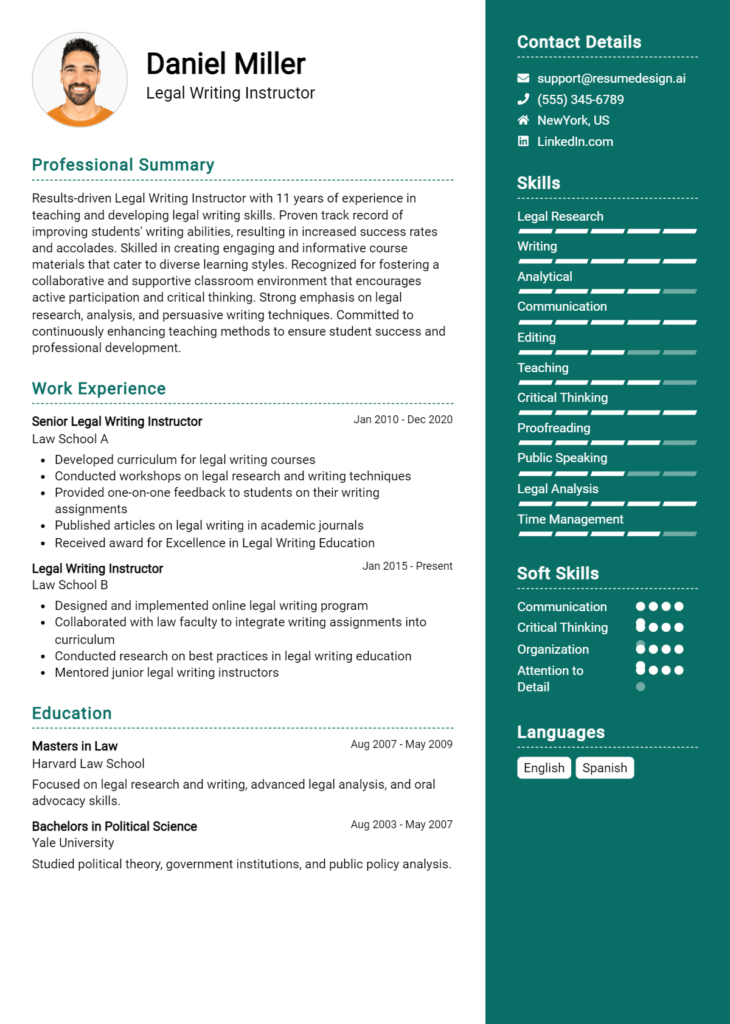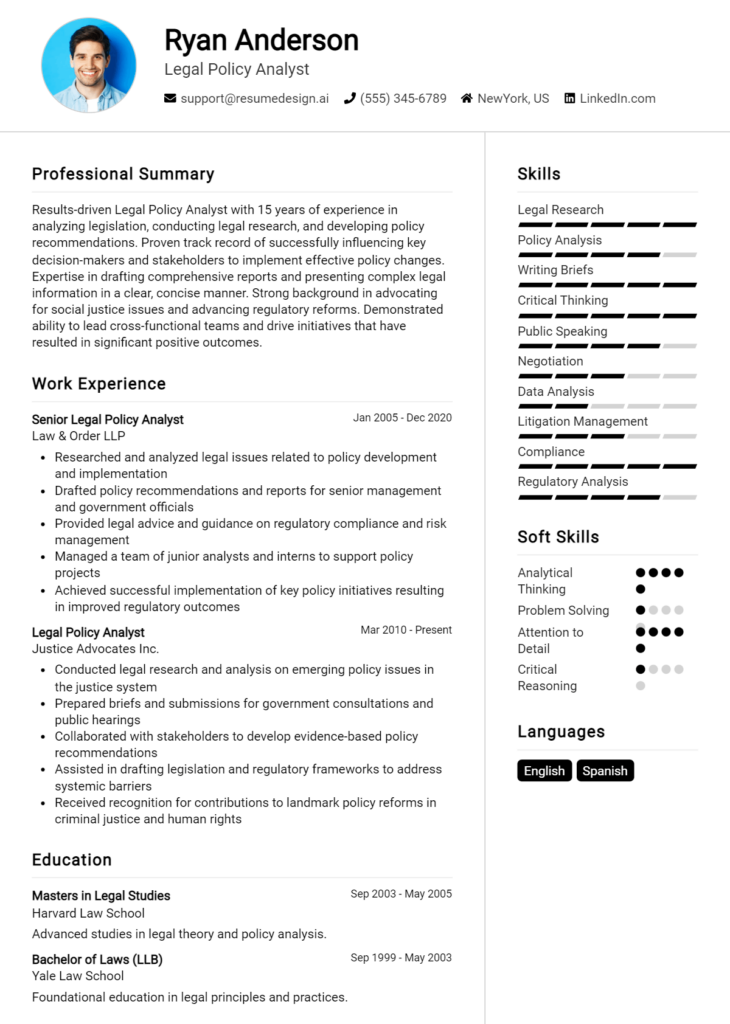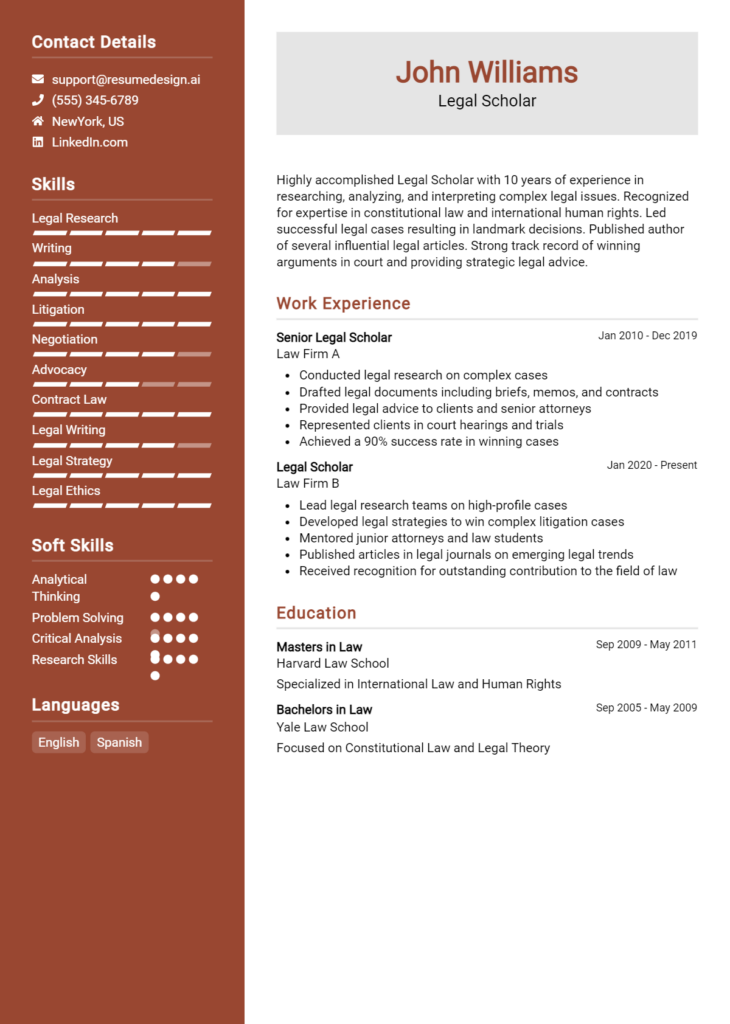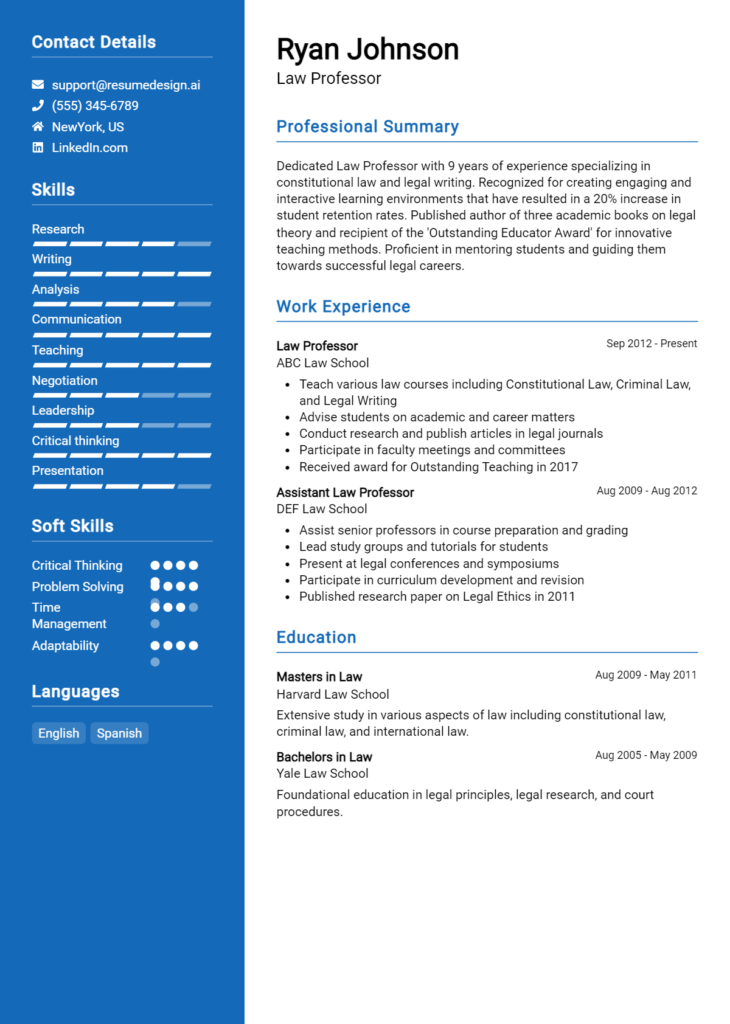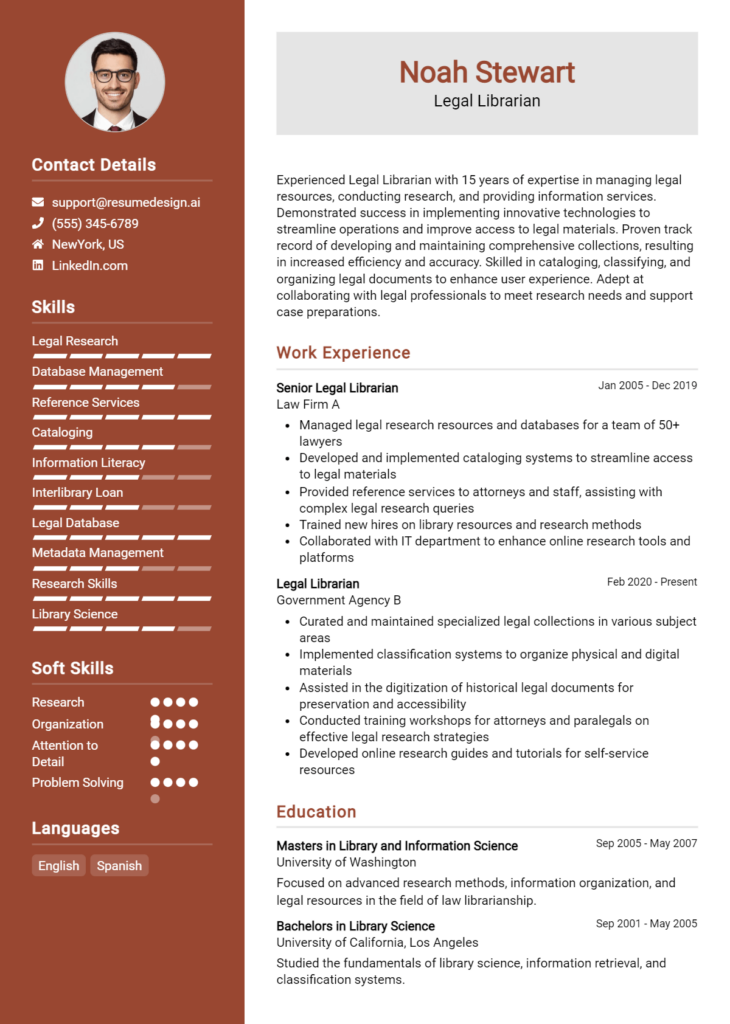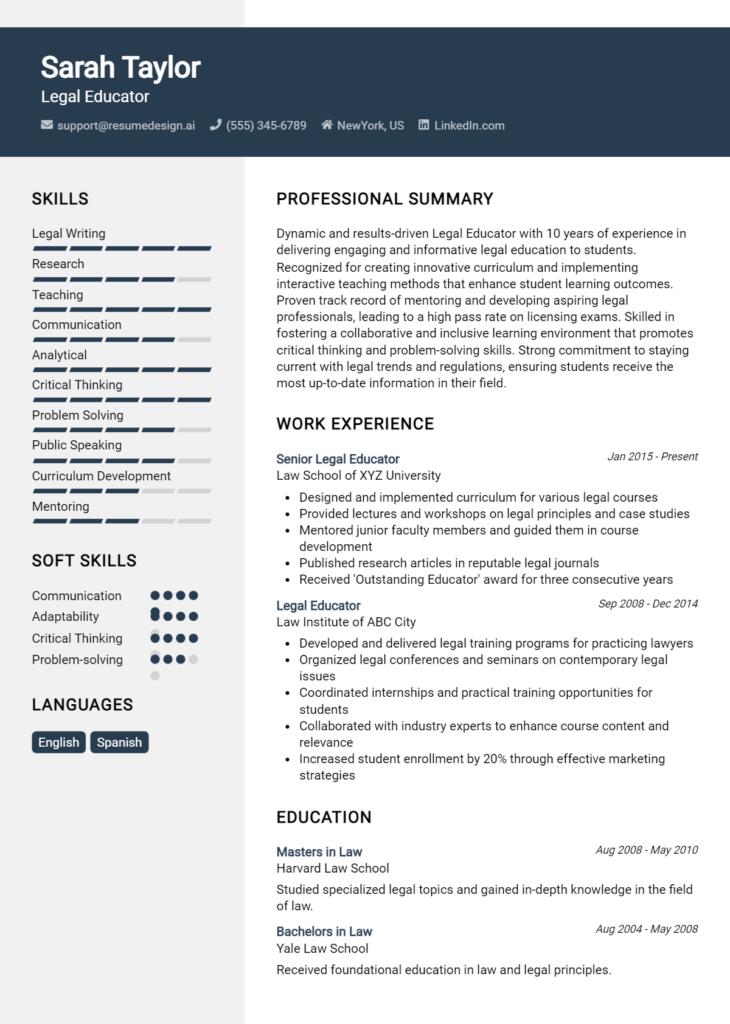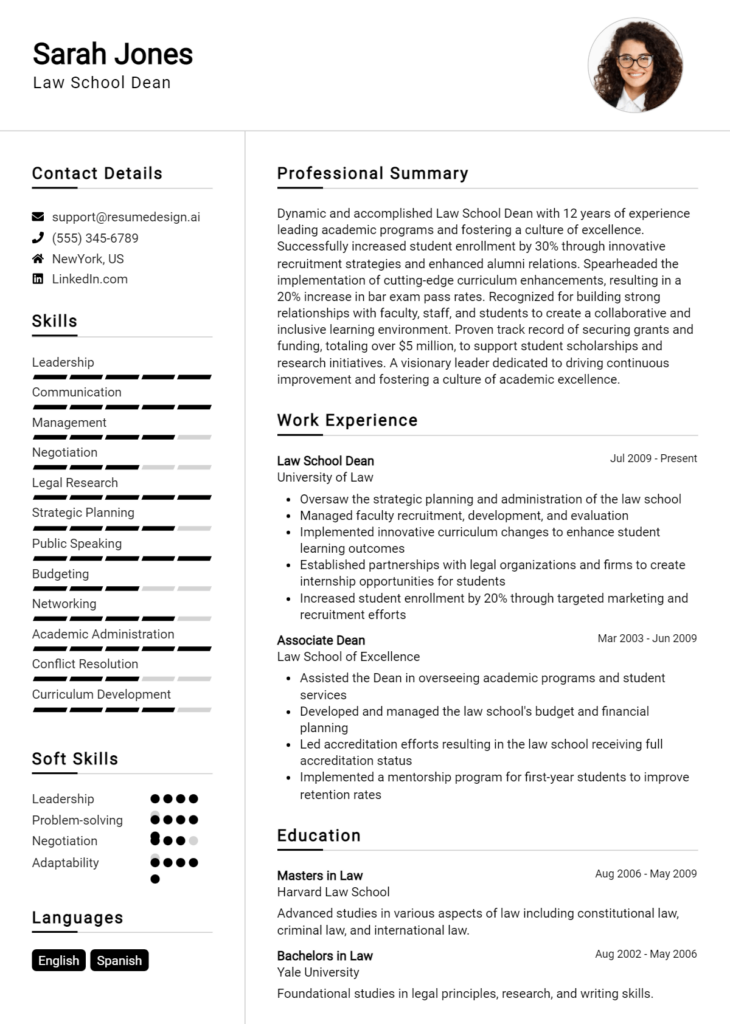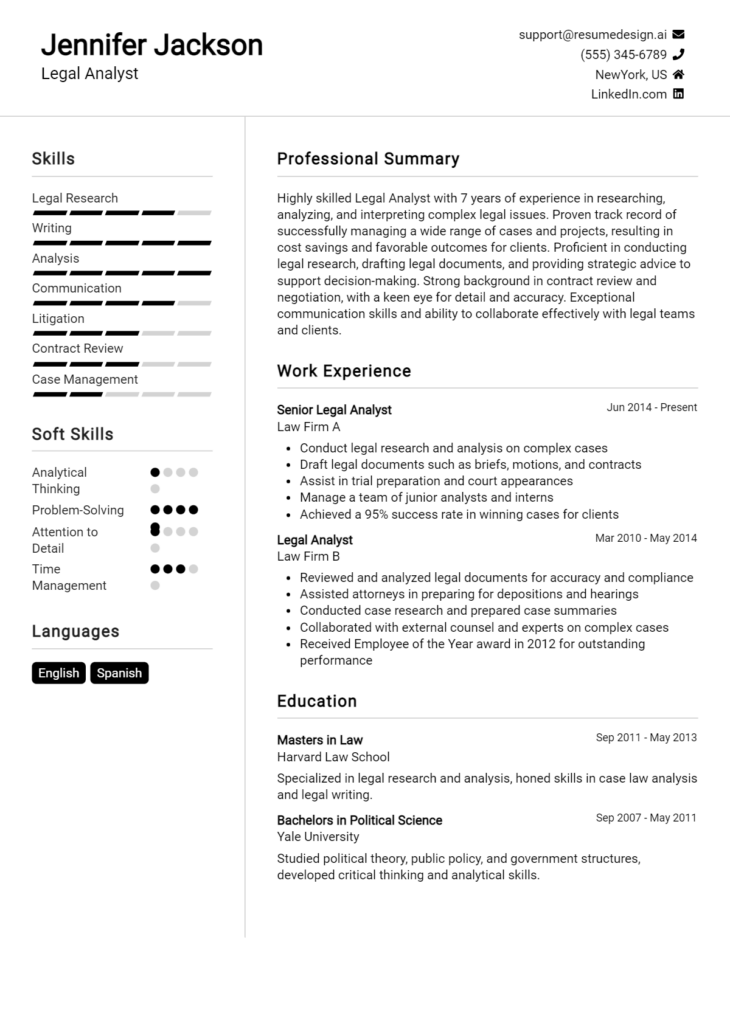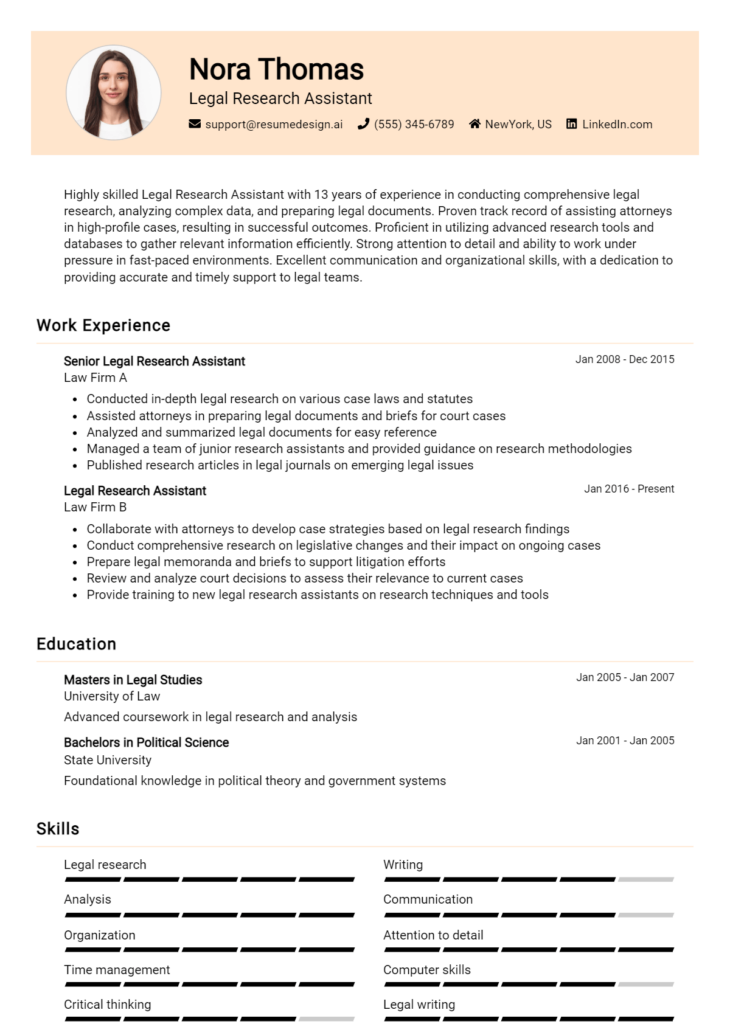Legal Research Consultant Core Responsibilities
A Legal Research Consultant plays a crucial role in bridging various departments by providing in-depth legal analysis, case law research, and regulatory insights. They must possess strong technical skills in legal databases, operational acumen to streamline processes, and exceptional problem-solving abilities to tackle complex legal challenges. These competencies contribute significantly to the organization’s overall goals, ensuring informed decision-making. A well-structured resume can effectively showcase these qualifications, highlighting the candidate’s value to potential employers.
Common Responsibilities Listed on Legal Research Consultant Resume
- Conduct comprehensive legal research and analysis on case law and statutes
- Prepare detailed reports summarizing legal findings and implications
- Collaborate with attorneys and other departments to support ongoing cases
- Review and interpret legal documents, contracts, and agreements
- Stay updated on the latest legal developments and trends
- Assist in the preparation of legal briefs and memoranda
- Evaluate and synthesize complex legal information for diverse audiences
- Provide training on legal research methodologies to team members
- Utilize various legal research tools and technologies effectively
- Manage multiple research projects under tight deadlines
- Ensure compliance with legal and ethical standards in research
High-Level Resume Tips for Legal Research Consultant Professionals
A well-crafted resume is crucial for Legal Research Consultant professionals, serving as the first impression candidates make on potential employers. In a field where attention to detail and analytical skills are paramount, a resume must not only showcase a candidate's qualifications but also reflect their unique achievements and contributions. A thoughtfully constructed resume can set you apart in a competitive job market, emphasizing both your legal acumen and your ability to navigate complex research challenges. This guide will provide practical and actionable resume tips specifically tailored for Legal Research Consultant professionals, helping you present your best self to prospective employers.
Top Resume Tips for Legal Research Consultant Professionals
- Tailor your resume to the specific job description, highlighting relevant skills and experiences that align with the employer's needs.
- Showcase your experience with legal research databases and tools, such as Westlaw, LexisNexis, or Bloomberg Law.
- Quantify your achievements where possible, for instance, by noting how your research led to successful case outcomes or saved time/resources.
- Include a dedicated section for certifications and continuing education relevant to legal research or consulting.
- Highlight any publications or presentations you have authored, demonstrating your expertise and thought leadership in the field.
- Utilize keywords from the job posting to increase visibility in Applicant Tracking Systems (ATS).
- Emphasize soft skills such as communication, analytical thinking, and collaboration, which are essential for consulting roles.
- Keep the format clean and professional, ensuring easy readability with clear headings and bullet points.
- Incorporate a brief summary statement at the top of your resume that succinctly conveys your professional identity and major accomplishments.
By implementing these tips, you can significantly increase your chances of landing a job in the Legal Research Consultant field. A strong, tailored resume not only highlights your qualifications but also demonstrates your understanding of the role and your commitment to delivering exceptional legal research services.
Why Resume Headlines & Titles are Important for Legal Research Consultant
In the competitive field of legal research consulting, a well-crafted resume headline or title can serve as a powerful tool to capture the attention of hiring managers. These brief but impactful phrases summarize a candidate's key qualifications and set the tone for the entire resume. A strong headline not only highlights relevant skills and experiences but also conveys professionalism and a clear understanding of the role being applied for. By being concise and directly related to the legal research consultant position, a compelling headline can make a significant difference in how a candidate is perceived, often determining whether they will be invited for an interview.
Best Practices for Crafting Resume Headlines for Legal Research Consultant
- Keep it concise: Limit your headline to one or two impactful phrases.
- Be role-specific: Tailor your headline to reflect the specific legal research consultant position.
- Highlight key skills: Include essential skills or qualifications that set you apart.
- Use action verbs: Start with strong action verbs to create a sense of dynamism.
- Focus on achievements: Mention notable accomplishments that demonstrate your expertise.
- Avoid jargon: Use clear and straightforward language to ensure broad understanding.
- Maintain professionalism: Ensure the tone is appropriate for the legal profession.
- Revise for relevance: Customize your headline for each application to align with the job description.
Example Resume Headlines for Legal Research Consultant
Strong Resume Headlines
Experienced Legal Research Consultant Specializing in Intellectual Property
Detail-Oriented Legal Analyst with 5+ Years in Litigation Support
Results-Driven Legal Researcher with Proven Track Record in Case Law Analysis
Weak Resume Headlines
Legal Consultant
Looking for Opportunities in Legal Research
The strong headlines are effective because they are specific, relevant, and convey the candidate's qualifications in a clear manner. They draw attention to the individual's expertise and accomplishments, making it easier for hiring managers to see their value at a glance. In contrast, the weak headlines fail to impress due to their vagueness and lack of specificity. They do not provide any insight into the candidate's unique skills or experiences, which diminishes their appeal and makes it difficult for hiring managers to see why they should be considered for the role.
Writing an Exceptional Legal Research Consultant Resume Summary
A well-crafted resume summary is essential for a Legal Research Consultant as it serves as the first impression for hiring managers. This brief yet impactful section of a resume provides a snapshot of a candidate's key skills, experience, and accomplishments, making it easier for recruiters to quickly assess their qualifications. A strong summary should be concise, engaging, and tailored specifically to the job being applied for, highlighting relevant expertise in legal research, analysis, and writing that aligns with the needs of the organization.
Best Practices for Writing a Legal Research Consultant Resume Summary
- Quantify Achievements: Use numbers and metrics to demonstrate your impact, such as the number of cases researched or the percentage of successful outcomes.
- Focus on Skills: Highlight specific legal research and analytical skills that are relevant to the position.
- Tailor the Summary: Customize your summary for each job application to match the job description and requirements.
- Be Concise: Keep the summary brief, ideally within 2-4 sentences, to maintain the reader's attention.
- Use Strong Action Verbs: Start sentences with powerful action verbs to convey confidence and proactivity.
- Include Keywords: Incorporate industry-specific keywords to help your resume get past Applicant Tracking Systems (ATS).
- Showcase Relevant Experience: Focus on experiences that directly relate to legal research and analysis.
- Highlight Professional Development: Mention any additional certifications or training that enhances your qualifications.
Example Legal Research Consultant Resume Summaries
Strong Resume Summaries
Detail-oriented Legal Research Consultant with over 5 years of experience conducting in-depth legal research and analysis. Successfully contributed to a 30% reduction in case preparation time through the implementation of efficient research methodologies.
Proficient in Westlaw and LexisNexis, I have supported over 100 litigation cases, providing critical insights that led to a 90% success rate in court rulings. Committed to delivering high-quality research under tight deadlines.
Experienced Legal Research Consultant with a proven track record in drafting comprehensive memos and briefs that have improved case outcomes by 25%. Strong analytical skills and attention to detail ensure thoroughness in all research tasks.
Weak Resume Summaries
Legal Research Consultant with experience in the legal field. Good at finding information and writing reports.
I have worked on various legal cases and can conduct research. Looking for a job where I can apply my skills.
The strong resume summaries are effective because they provide specific metrics and examples of achievements that demonstrate the candidate's capabilities and relevance to the role. They utilize precise language and keywords, showcasing the candidate's expertise and potential contributions. In contrast, the weak summaries lack detail, quantifiable outcomes, and specificity, making them appear generic and less compelling to hiring managers.
Work Experience Section for Legal Research Consultant Resume
The work experience section of a Legal Research Consultant resume is crucial as it serves as a key indicator of the candidate's technical skills, leadership abilities, and commitment to delivering high-quality results. This section not only highlights the depth and relevance of the applicant's previous roles but also allows them to quantify their achievements and demonstrate how their experience aligns with industry standards. By effectively showcasing their capabilities and contributions, candidates can significantly enhance their appeal to potential employers in the legal field.
Best Practices for Legal Research Consultant Work Experience
- Highlight technical skills relevant to legal research, such as proficiency with research databases and legal writing software.
- Quantify achievements by including metrics, such as the number of cases researched or the percentage of successful outcomes.
- Emphasize collaboration by detailing experiences working with legal teams or cross-functional departments.
- Use action verbs to describe responsibilities and accomplishments, making the statements more impactful.
- Tailor each entry to align with the specific job you're applying for, focusing on relevant experiences.
- Include any leadership roles or initiatives that demonstrate your ability to manage teams effectively.
- Highlight continuous professional development, such as certifications or training in legal research techniques.
- Maintain clarity and conciseness, ensuring that each statement is easy to read and understand.
Example Work Experiences for Legal Research Consultant
Strong Experiences
- Conducted comprehensive legal research for over 100 cases, resulting in a 95% success rate in litigation outcomes.
- Led a team of five legal researchers, enhancing workflow efficiency by 30% through the implementation of a new project management system.
- Developed and presented a legal research training program that improved team proficiency by 40%, as measured by pre- and post-training assessments.
- Collaborated with senior attorneys to draft over 50 legal briefs, achieving a 100% acceptance rate in court submissions.
Weak Experiences
- Performed legal research for various cases.
- Assisted in team projects and contributed to some reports.
- Worked with attorneys on legal documents.
- Helped conduct research for different legal matters.
The examples categorized as strong experiences are considered effective because they provide specific, quantifiable outcomes and clearly demonstrate the candidate's technical skills and leadership capabilities. In contrast, the weak experiences are vague and lack detail, making it difficult for potential employers to gauge the candidate's actual contributions and effectiveness in previous roles. By focusing on specific achievements and collaborative efforts, candidates can create a more compelling narrative of their professional journey.
Education and Certifications Section for Legal Research Consultant Resume
The education and certifications section of a Legal Research Consultant resume is crucial as it serves to demonstrate the candidate's academic qualifications, relevant industry certifications, and commitment to continuous professional development. This section not only showcases the foundational knowledge necessary for effective legal research but also highlights specialized training that aligns with specific job requirements. By including pertinent coursework, recognized certifications, and ongoing learning efforts, candidates can significantly enhance their credibility and demonstrate their alignment with the expectations of potential employers in the legal field.
Best Practices for Legal Research Consultant Education and Certifications
- Prioritize relevant degrees such as Juris Doctor (JD) or Master of Legal Studies (MLS).
- Include industry-recognized certifications like Certified Legal Research Specialist (CLRS) or similar.
- Highlight specialized training in legal research tools and methodologies.
- List relevant coursework that pertains directly to legal research or analysis.
- Use clear and concise formatting to enhance readability and impact.
- Ensure all listed credentials are current and valid.
- Include any memberships in legal research organizations or associations.
- Emphasize advanced degrees or certifications that showcase a commitment to the field.
Example Education and Certifications for Legal Research Consultant
Strong Examples
- Juris Doctor (JD), Harvard Law School, 2020
- Certified Legal Research Specialist (CLRS), National Association of Legal Professionals, 2021
- Advanced Legal Research Course, American Bar Association, 2022
- Master of Legal Studies (MLS), University of California, Berkeley, 2019
Weak Examples
- Bachelor of Arts in English Literature, University of Michigan, 2010
- Certificate in Basic Computer Skills, Community College, 2015
- Legal Research Fundamentals (Outdated Course), Online Platform, 2018
- High School Diploma, Springfield High School, 2006
The strong examples are considered effective because they directly align with the skills and qualifications needed for a Legal Research Consultant, showcasing advanced degrees and recognized certifications that enhance the candidate's expertise. In contrast, the weak examples are ineffective as they include outdated or irrelevant qualifications that do not contribute to the candidate's suitability for the role, which could lead potential employers to overlook their application.
Top Skills & Keywords for Legal Research Consultant Resume
As a Legal Research Consultant, possessing the right combination of skills is crucial for effectively supporting legal professionals and ensuring accurate, thorough research outcomes. A well-crafted resume that highlights both soft and hard skills can set you apart in a competitive job market. Clients and employers seek individuals who not only have the technical expertise to navigate complex legal databases but also possess the interpersonal capabilities to communicate findings clearly and collaborate with diverse teams. By showcasing these skills, you can demonstrate your value and readiness to excel in a dynamic legal environment.
Top Hard & Soft Skills for Legal Research Consultant
Soft Skills
- Strong analytical thinking
- Effective communication
- Attention to detail
- Time management
- Problem-solving
- Critical thinking
- Adaptability
- Collaboration and teamwork
- Research proficiency
- Ethical reasoning
- Organization skills
- Interpersonal skills
- Initiative
- Conflict resolution
- Customer service orientation
- Cultural competency
- Negotiation skills
Hard Skills
- Proficient in legal research tools (e.g., Westlaw, LexisNexis)
- Knowledge of legal terminology and concepts
- Experience with case law analysis
- Familiarity with statutory research
- Document drafting and review
- Understanding of legal writing standards
- Data analysis and interpretation
- Familiarity with regulatory compliance
- Proficiency in Microsoft Office Suite
- Experience with electronic discovery (e-discovery)
- Knowledge of litigation processes
- Ability to create legal briefs and memos
- Research methodology expertise
- Familiarity with case management software
- Web research skills
- Citation management
- Knowledge of intellectual property laws
Developing a strong foundation in both skills and work experience will enhance your profile as a Legal Research Consultant, making you a valuable asset to any legal team.
Stand Out with a Winning Legal Research Consultant Cover Letter
Dear [Hiring Manager's Name],
I am writing to express my interest in the Legal Research Consultant position at [Company Name] as advertised on [where you found the job posting]. With a robust background in legal research and analysis, coupled with my keen attention to detail and strong analytical skills, I am confident in my ability to contribute effectively to your team. My experience in navigating complex legal databases and synthesizing case law to support attorneys in litigation has equipped me with the tools necessary to provide invaluable insights and enhance decision-making processes.
During my tenure at [Previous Company Name], I successfully conducted extensive legal research on various topics, ranging from corporate law to intellectual property rights. My efforts not only ensured compliance with current regulations but also facilitated the development of strategic legal arguments that led to favorable outcomes for clients. I pride myself on my ability to distill intricate legal information into clear, actionable recommendations tailored to the specific needs of the case at hand. Furthermore, my proficiency in utilizing advanced research tools and technologies allows me to efficiently gather data and present findings in a coherent manner.
I am particularly drawn to [Company Name] because of its commitment to excellence and innovation in the legal field. I am eager to collaborate with your talented team to deliver high-quality research that supports your clients’ needs and strengthens your practice. I believe my proactive approach to problem-solving and my dedication to continuous learning will make me a valuable asset to your organization. I would welcome the opportunity to further discuss how my background and skills align with the goals of [Company Name].
Thank you for considering my application. I look forward to the possibility of contributing to your esteemed firm as a Legal Research Consultant and am excited about the opportunity to help drive successful outcomes for your clients.
Sincerely,
[Your Name]
[Your Phone Number]
[Your Email Address]
Common Mistakes to Avoid in a Legal Research Consultant Resume
When crafting a resume for a Legal Research Consultant position, it's crucial to avoid common pitfalls that can undermine your qualifications and experiences. A well-structured resume should effectively showcase your skills, but many candidates make mistakes that lead to missed opportunities. Here are some common errors to avoid when preparing your legal research consultant resume:
Generic Objective Statement: Using a vague or generic objective can make your resume blend in with the rest. Tailor your objective to reflect your specific goals and how they align with the position you’re applying for.
Lack of Relevant Keywords: Failing to incorporate industry-specific keywords can hurt your chances of passing through Applicant Tracking Systems (ATS). Research the job description and include relevant terms that highlight your expertise.
Overloading with Jargon: While it's important to demonstrate your knowledge, excessive legal jargon can alienate readers. Strike a balance by using clear and concise language that conveys your expertise without overwhelming the reader.
Inconsistent Formatting: An unorganized resume with inconsistent fonts, bullet points, or spacing can distract from your qualifications. Maintain a uniform format to enhance readability and professionalism.
Neglecting Achievements: Focusing solely on job duties instead of accomplishments can weaken your resume. Highlight specific achievements, such as successful research projects or contributions to case outcomes, to demonstrate your impact.
Inadequate Tailoring for Each Application: Sending out the same resume for multiple positions can be detrimental. Customize your resume for each job application by emphasizing the most relevant skills and experiences for the specific role.
Ignoring Education and Certifications: Underplaying your educational background or certifications can be a missed opportunity. Clearly list your degrees and relevant certifications to showcase your qualifications and commitment to professional development.
Lengthy Descriptions: Providing overly detailed job descriptions can dilute the focus on your key skills and achievements. Be concise and prioritize the most relevant information to keep your resume impactful and easy to digest.
Conclusion
As we conclude our exploration of the role of a Legal Research Consultant, it's essential to highlight the critical skills and qualifications that can set you apart in this competitive field. A successful Legal Research Consultant must demonstrate expertise in legal research methodologies, strong analytical skills, and a keen understanding of various legal systems. Additionally, excellent written and verbal communication abilities are vital for conveying complex legal concepts clearly and effectively.
In this ever-evolving landscape, staying updated with the latest legal resources and technologies can enhance your research efficiency and accuracy. Moreover, networking with legal professionals and continuously honing your skills through workshops or certifications can provide a significant advantage.
Now, as you reflect on your qualifications and experiences, it's a perfect time to review your Legal Research Consultant resume. Ensure it effectively showcases your unique strengths and accomplishments. To assist you in this process, consider utilizing helpful resources such as resume templates, resume builder, resume examples, and cover letter templates. These tools can help you create a polished and professional presentation of your skills, making a compelling case for your candidacy in the legal field. Take action today and invest in your career by refining your resume!

